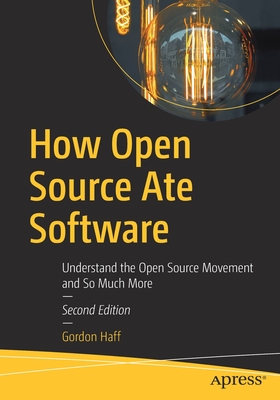How Open Source Ate Software: Understand the Open Source Movement and So Much More, 2/e
暫譯: 開源如何改變軟體:理解開源運動及更多,第二版
Haff, Gordon
買這商品的人也買了...
相關主題
商品描述
Learn how free software became open source and how you can sell open source software. This book provides a historical context of how open source has thoroughly transformed how we write software, how we cooperate, how we communicate, how we organize, and, ultimately, how we think about business values.
This fully updated second edition includes an entire chapter on legal considerations such as trademarks and the latest happenings in open source licensing. It also expands on open hardware trends such as RISC-V, open governance, and the difference between community projects and commercial products, especially as seen through the lens of security.
You'll look at project and community examples including Linux, BSD, Apache, and Kubernetes, understand the open source development model, and how open source has influenced approaches more broadly, even within proprietary software, such as open betas. You'll also examine the flipside, the "Second Machine Age," and the challenges of open source-based business models.
Today, open source serves as shorthand for much broader trends and behaviors. It's not just about a free (in all senses of the word) alternative to commercial software. It increasingly is the new commercial software. How Open Source Ate Software, second edition reveals how open source has much in common, and is often closely allied, with many other trends in business and society. You'll see how it enables projects that go beyond any individual company. That makes open source not just a story about software, but a story about almost everything.
What You'll Learn
- The opportunities that open source creates and the challenges that come with them
- The ways in which companies can create business models to successfully sell "free" software
- How the open source development model works from creating communities to selling commercial products
- The important issues associated with open source project and product governance and licensing
- How open source principles can apply more broadly to DevOps and other organizational practices
Who This Book Is For
Anyone who is contemplating building a community and a business around open source software.
商品描述(中文翻譯)
學習自由軟體如何演變為開源軟體,以及如何銷售開源軟體。本書提供了開源如何徹底改變我們編寫軟體、合作、溝通、組織,最終如何思考商業價值的歷史背景。
這本全面更新的第二版包含了一整章有關法律考量的內容,例如商標以及開源授權的最新動態。它還擴展了開放硬體的趨勢,如 RISC-V、開放治理,以及社群專案與商業產品之間的差異,特別是從安全性的角度來看。
您將會查看包括 Linux、BSD、Apache 和 Kubernetes 的專案和社群範例,了解開源開發模型,以及開源如何更廣泛地影響其他方法,甚至在專有軟體中,例如開放測試版。您還將檢視其反面,即「第二機器時代」,以及基於開源的商業模型所面臨的挑戰。
如今,開源作為更廣泛趨勢和行為的簡稱。它不僅僅是商業軟體的免費(在所有意義上)替代品。它越來越成為新的商業軟體。《How Open Source Ate Software, second edition》揭示了開源與商業和社會中許多其他趨勢有著許多共同之處,並且經常密切相關。您將看到它如何促進超越任何單一公司的專案。這使得開源不僅僅是一個關於軟體的故事,而是一個關於幾乎所有事物的故事。
您將學到的內容:
- 開源所創造的機會及其帶來的挑戰
- 公司如何創建商業模型以成功銷售「免費」軟體
- 開源開發模型如何運作,從建立社群到銷售商業產品
- 與開源專案和產品治理及授權相關的重要議題
- 開源原則如何更廣泛地應用於 DevOps 和其他組織實踐
本書適合任何考慮圍繞開源軟體建立社群和商業的人士。
作者簡介
Gordon Haff is Red Hat technology evangelist, is a frequent and highly acclaimed speaker at customer and industry events, and helps develop strategy across Red Hat's full portfolio of cloud solutions. He is the co-author of Pots and Vats to Computers and Apps: How Software Learned to Package Itself in addition to numerous other publications. Prior to Red Hat, Gordon wrote hundreds of research notes, was frequently quoted in publications like The New York Times on a wide range of IT topics, and advised clients on product and marketing strategies. Earlier in his career, he was responsible for bringing a wide range of computer systems, from minicomputers to large UNIX servers, to market while at Data General. Gordon has engineering degrees from MIT and Dartmouth and an MBA from Cornell's Johnson School. Follow him on Twitter @ghaff.
作者簡介(中文翻譯)
**戈登·哈夫**(Gordon Haff)是紅帽(Red Hat)的技術傳道者,經常在客戶和行業活動中擔任演講者,並協助制定紅帽全系列雲端解決方案的策略。他是《從鍋子和桶子到電腦和應用程式:軟體如何學會自我包裝》的共同作者,並發表了許多其他出版物。在加入紅帽之前,戈登撰寫了數百篇研究報告,並在《紐約時報》等出版物中就各種IT主題被頻繁引用,還為客戶提供產品和行銷策略的建議。在職業生涯的早期,他在Data General負責將各種計算機系統(從小型計算機到大型UNIX伺服器)推向市場。戈登擁有麻省理工學院(MIT)和達特茅斯學院(Dartmouth)的工程學位,以及康奈爾大學約翰遜商學院(Cornell's Johnson School)的MBA學位。您可以在Twitter上關注他 @ghaff。














